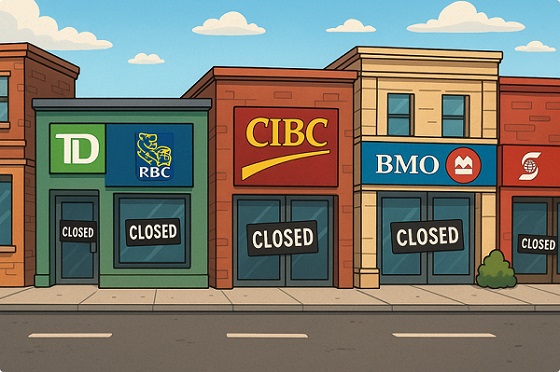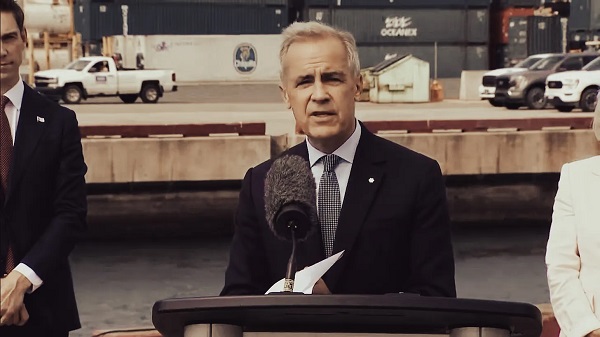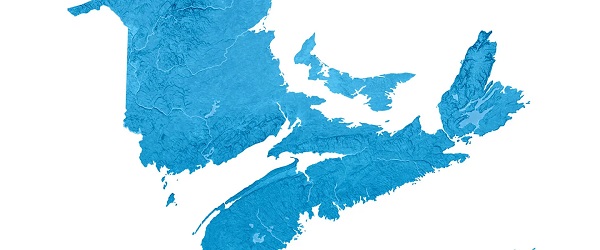Frontier Centre for Public Policy
The RCMP Used To Uphold The Law. Now It’s Enforcing An Ideology

From the Frontier Centre for Public Policy
Research VP Marco Navarro-Genie argues the RCMP isn’t neutral anymore—it’s treating dissent from gender orthodoxy as dangerous extremism.
The Mounties are no longer neutral enforcers of law. They’ve become defenders of state-approved ideology
Canada’s national police force is undergoing a dangerous transformation. It is shifting from an institution that upholds the law to one that enforces progressive ideology. That change was evident in a recent CBC interview with RCMP Staff Sergeant Camille Habel, a trained communications officer. Speaking in her official role, Habel warned that someone shifting from support for “equal gender rights” to “traditional values” may be showing signs of radicalization.
This wasn’t a casual remark or personal opinion. Communications officers don’t freelance. They speak for the institution. That makes her words more than commentary—they’re policy signals.
Habel didn’t define “gender rights” or “traditional values,” but the meaning was clear. She was signalling an adherence to a modern doctrine: that gender is fluid, entirely self-declared and must be affirmed through social or medical intervention, regardless of age or biology.
By adopting such a view, the RCMP has stepped beyond impartiality. It is no longer enforcing the law. It is defending a belief system. And dissent from that system is increasingly treated as deviance.
This logic mirrors the structure of religious apostasy. In radical belief systems, apostates—those who abandon the faith—are often considered more dangerous than outsiders. Non-believers might be persuaded, but a defector threatens internal cohesion and must be punished.
Canada’s institutional progressivism operates in much the same way. If you never accepted its dogma, you may be dismissed as uninformed. But if you once affirmed it and now question it, you are seen as unstable and potentially dangerous.
Progressive ideology insists that history moves only forward, toward greater inclusion, affirmation and fluidity. Any reversal is cast not as reconsideration but regression. That’s why the RCMP would never suggest that someone who once affirmed biological sex but now embraces the idea of 72 genders may be radicalizing. Even when such a shift contradicts biology and common sense, it is celebrated as progress.
What matters is not the reasoning behind the change, but the ideological direction. Public safety is no longer about upholding neutral laws. It’s about protecting an approved narrative.
In place of open debate, we get slogans. “Trans women are women.” “Children can consent to medical transition.” “Gender is a spectrum.” These are not policy proposals. They are mantras. To question them is to risk scrutiny.
And in Canada today, scrutiny can bring consequences. Parents who challenge their child’s transition may lose custody. Medical professionals who question puberty blockers or irreversible surgeries face disciplinary action. Journalists, academics and commentators who criticize gender orthodoxy are deplatformed, defunded or publicly discredited.
These are not isolated incidents. They reflect a growing institutional reflex to treat dissent not as disagreement but as danger.
After a backlash to Habel’s comments, the RCMP offered a clarification. She didn’t mean traditional values are illegal, they said, only that acting on extreme beliefs could be problematic. But that misses the point.
The concern isn’t what’s criminal. It’s what’s being reframed as suspicious. Once a belief is coded as “pre-radical,” it becomes easier to monitor, isolate and punish. That discretion now lies with institutions that have openly adopted ideological positions.
Meanwhile, radical actions carried out in the name of progressivism—placing children on puberty blockers, approving surgeries for minors, silencing dissenting professionals—are tolerated, subsidized and protected.
These interventions are invasive, irreversible and often life-altering, yet institutions like the RCMP do not label any of this dangerous. That label is reserved for those who step away from orthodoxy.
A citizen who quietly shifts from affirmation to doubt is flagged, not for what they’ve done but for what they’ve stopped believing.
That is the real offence: defection from the state’s sanctioned worldview.
This shift reveals something more troubling than a single interview. The RCMP, once expected to apply the law impartially, now behaves as an agent of ideological conformity. It is no longer neutral. It is no longer merely a law enforcement body. It is enforcing belief.
We must take Habel’s statement seriously—not because it was extreme, but because it was institutional. It shows how dissent is now handled, not through discussion but through suspicion. Where disagreement was once normal in a democratic society, it is now recast as instability.
Freedom of belief doesn’t vanish in a single moment. It is reframed as extremism, then gradually excluded from legitimacy.
We’ve seen this before—in theocratic regimes, authoritarian states and ideological cults.
Now we are watching it happen in Canada.
And the RCMP is enforcing it.
Marco Navarro-Genie is vice-president of research at the Frontier Centre for Public Policy and co-author, with Barry Cooper, of Canada’s COVID: The Story of a Pandemic Moral Panic (2023).
Banks
Debanking Is Real, And It’s Coming For You

From the Frontier Centre for Public Policy
Marco Navarro-Genie warns that debanking is turning into Ottawa’s weapon of choice to silence dissent, and only the provinces can step in to protect Canadians.
Disagree with the establishment and you risk losing your bank account
What looked like a narrow, post-convoy overreach has morphed into something much broader—and far more disturbing. Debanking isn’t a policy misfire. It’s turning into a systemic method of silencing dissent—not just in Canada, but across the Western world.
Across Canada, the U.S. and the U.K., people are being cut off from basic financial services not because they’ve broken any laws, but because they hold views or support causes the establishment disfavors. When I contacted Eva Chipiuk after RBC quietly shut down her account, she confirmed what others had only whispered: this is happening to a lot of people.
This abusive form of financial blacklisting is deep, deliberate and dangerous. In the U.K., Nigel Farage, leader of Reform UK and no stranger to controversy, was debanked under the fig leaf of financial justification. Internal memos later revealed the real reason: he was deemed a reputational risk. Cue the backlash, and by 2025, the bank was forced into a settlement complete with an apology and compensation. But the message had already been sent.
That message didn’t stay confined to Britain. And let’s not pretend it’s just private institutions playing favourites. Even in Alberta—where one might hope for a little more institutional backbone—Tamara Lich was denied an appointment to open an account at ATB Financial. That’s Alberta’s own Crown bank. If you think provincial ownership protects citizens from political interference, think again.
Fortunately, not every institution has lost its nerve. Bow Valley Credit Union, a smaller but principled operation, has taken a clear stance: it won’t debank Albertans over their political views or affiliations. In an era of bureaucratic cowardice, Bow Valley is acting like a credit union should: protective of its members and refreshingly unapologetic about it.
South of the border, things are shifting. On Aug. 7, 2025, U.S. President Donald Trump signed an executive order titled “Guaranteeing Fair Banking for All Americans.” The order prohibits financial institutions from denying service based on political affiliation, religion or other lawful activity. It also instructs U.S. regulators to scrap the squishy concept of “reputational risk”—the bureaucratic smoke screen used to justify debanking—and mandates a review of past decisions. Cases involving ideological bias must now be referred to the Department of Justice.
This isn’t just paperwork. It’s a blunt declaration: access to banking is a civil right. From now on, in the U.S., politically motivated debanking comes with consequences.
Of course, it’s not perfect. Critics were quick to notice that the order conveniently omits platforms like PayPal and other payment processors—companies that have been quietly normalizing debanking for over a decade. These are the folks who love vague “acceptable use” policies and ideological red lines that shift with the political winds. Their absence from the order raises more than a few eyebrows.
And the same goes for another set of financial gatekeepers hiding in plain sight. Credit card networks like Visa, American Express and Mastercard have become powerful, unaccountable referees, denying service to individuals and organizations labelled “controversial” for reasons that often boil down to politics.
If these players aren’t explicitly reined in, banks might play by the new rules while the rest of the financial ecosystem keeps enforcing ideological conformity by other means.
If access to money is a civil right, then that right must be protected across the entire payments system—not just at your local branch.
While the U.S. is attempting to shield its citizens from ideological discrimination, there is a noticeable silence in Canada. Not a word of concern from the government benches—or the opposition. The political class is united, apparently, in its indifference.
If Ottawa won’t act, provinces must. That makes things especially urgent for Alberta and Saskatchewan. These are the provinces where dissent from Ottawa’s policies is most common—and where citizens are most likely to face politically motivated financial retaliation.
But they’re not powerless. Both provinces boast robust credit union systems. Alberta even owns ATB Financial, a Crown bank originally created to protect Albertans from central Canadian interference. But ownership without political will is just branding.
If Alberta and Saskatchewan are serious about defending civil liberties, they should act now. They can legislate protections that prohibit financial blacklisting based on political affiliation or lawful advocacy. They can require due process before any account is frozen. They can strip “reputational risk” from the rulebooks and make it clear to Ottawa: using banks to punish dissenters won’t fly here.
Because once governments—or corporations doing their bidding—can cut off your access to money for holding the wrong opinion, democracy isn’t just threatened.
It’s already broken.
Marco Navarro-Genie is vice-president of research at the Frontier Centre for Public Policy and co-author, with Barry Cooper, of Canada’s COVID: The Story of a Pandemic Moral Panic (2023).
Business
Manitoba Must Act Now To Develop Its Northern Ports

From the Frontier Centre for Public Policy
With U.S. trade risks rising, Manitoba has a fleeting shot to turn Churchill into a year-round Arctic shipping hub. Without bold investment, the North’s economic and strategic promise will slip away.
The window to turn Manitoba’s northern coast into a year-round shipping hub is closing fast
Rising trade tensions with the United States have given Manitoba a rare second chance to develop its northern ports. But if the province doesn’t act decisively, it will miss a historic opportunity to gain a permanent place in global trade—and reinforce Canadian sovereignty.
Manitoba exports billions in agricultural, mineral and manufactured goods to the U.S., so any disruption in that relationship has ripple effects across the province’s economy. Diversifying trade routes isn’t just smart policy: it’s an economic necessity.
Churchill, a small town on the western shore of Hudson Bay in northern Manitoba, is Canada’s only deepwater port connected to the Arctic. Churchill requires regular dredging in an ecologically sensitive area at the mouth of the Churchill River. While most attention has focused on Churchill, its potential will remain limited without serious investment to make it a year-round operation. Right now, it’s only usable during the summer months.
Premier Wab Kinew recently highlighted Churchill as a strategic asset for asserting Canada’s northern sovereignty. That may be true, but symbolic importance alone won’t sustain it. Economic value and operational reliability will. The port’s rail accessibility gives it an advantage if it can handle the volume and meet international trade demands year-round. However, the railway to Churchill is challenged because of unstable permafrost, affecting long-term reliability.
Feiyue Wang, a University of Manitoba professor and Canada Research Chair, sees Churchill as a potential game-changer. As climate predictions see a reduction in sea ice in the Canadian Arctic, shipping lanes that were once blocked for most of the year could become viable trade routes. That’s already happening.
The Arctic Gateway Group has shipped zinc concentrate through Churchill. Alberta Premier Danielle Smith and others have promoted sending oil through it. These aren’t just theoretical opportunities: they’re early evidence of what’s possible. But for Churchill to become a true supply chain hub, it needs infrastructure, investment and long-term political commitment.
Governments have already put money into the port and its rail link. But they must finish the job. That means building the capacity for four-season shipping, attracting private investment, and showing that the port will be viable over time. Manitoba should also press Ottawa to maintain a military presence in the region and use the port to reinforce northern sovereignty.
But if Manitoba is serious about developing northern trade infrastructure, it should also consider a second, ambitious alternative.
The Neestanan utility corridor, an Indigenous-led initiative, proposes a new infrastructure route—rail, roads and energy pipelines—across northern Alberta, Saskatchewan and Manitoba. The corridor would terminate at a year-round, multi-modal port on Hudson Bay, north of the Nelson River. Led by First Nations and Métis communities, Neestanan offers a broader vision for economic reconciliation and northern opportunity. Port Nelson is a deeper water port and its railway line is not in a permafrost zone, making it more feasible for year-round operations.
A century ago, Prime Minister Wilfrid Laurier’s government debated whether Churchill or Port Nelson should serve as the main northern terminal. Ottawa initially backed Port Nelson but later abandoned it due to silt accumulation. Churchill became the chosen site.
Today, both locations deserve a fresh look. With modern engineering, sediment shifts and Indigenous-led proposals, what wasn’t feasible in 1910 may now be not only possible, but necessary.
Churchill was originally built to ship Prairie grain to global markets. But its future lies in more than grain. With the right investment, it could handle a much wider range of goods and help secure Canada’s place in the evolving Arctic economy.
In short, the opportunity lies in developing both ports based on their practical and feasible characteristics, aiming to attract private investment.
This is Manitoba’s moment. But the window of opportunity won’t stay open forever. Other jurisdictions are moving faster. Manitoba must act swiftly—before the opportunity is lost.
This is a revised version of an earlier commentary published here
-

 Business2 days ago
Business2 days agoMark Carney’s Climate Competitiveness Pitch Falls Flat
-

 Business2 days ago
Business2 days agoCanada Post is broken beyond repair
-

 Alberta2 days ago
Alberta2 days agoMaritime provinces can enact policies to reduce reliance on Alberta… ehem.. Ottawa
-

 Business2 days ago
Business2 days agoCanada can’t allow so many people to say ‘no’ to energy projects
-

 International2 days ago
International2 days agoNepal Tried To Censor The Internet. Young People Set Parliament on Fire.
-

 Crime2 days ago
Crime2 days agoCharlotte train killer hit with federal murder charge, faces max penalty
-

 Alberta2 days ago
Alberta2 days agoYes Alberta has a spending problem. But it has solutions too
-

 Business1 day ago
Business1 day agoHealth-care costs for typical Canadian family will reach over $19,000 this year







